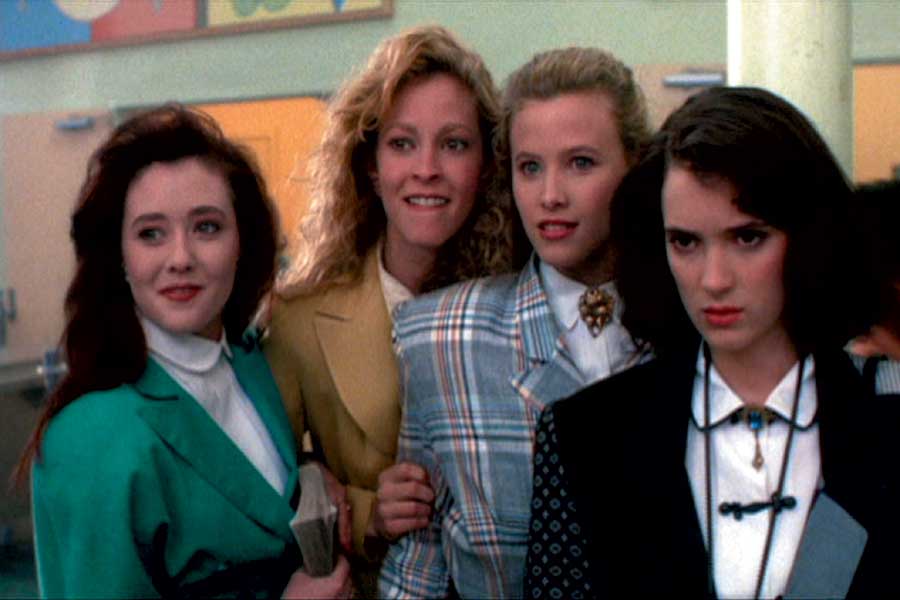We can hardly believe it but Heathers is turning 25 this year. We thought we’d celebrate with some slushies, croquet, and TNT, but that seemed like a lot of trouble so we’re rounding up our seven favorite slang terms from the movie instead.
EXPLETIVE ALERT: if you’re familiar with Heathers, you’re familiar with its, um, colorful expletives, two of which will be discussed at some length below.
damage
Veronica: “What is your damage, Heather?”
The writer of the film, Daniel Waters, says he stole the phrase, “What’s your damage?” — another way of saying, “What’s your problem?” — from “one of [his] little camper girls” for whom he was a camp counselor, presumably in the late 1970s or early 1980s.
What’s the damage?, meaning “how much will it cost?”, comes from the mid-18th century, says the Oxford English Dictionary. We couldn’t find a year of origin for What’s your problem? meaning “why are you upset?” However, according to the OED, that’s not my problem is from the late 1940s and that’s your (his, etc.) problem is from around 1951.
fuck me gently with a chainsaw
Veronica: “Why can’t we talk to other kinds of people?”
Heather Chandler: “Fuck me gently with a chainsaw. Do I look like Mother Theresa?”
Fuck me in this context is “an expression of surprise, contempt, outrage, disgust, boredom, frustration, or of dismay at undesired events happening to oneself.” The OED says the phrase has been around since at least the late 1920s, evinced in the following from The Middle Parts of Fortune by Frederic Manning: “‘Well, you can fuck me!’ exclaimed the astonished Martlow.”
Waters says that one of his college friends “used to say ‘F— me gently with a crowbar,” and that “apparently ‘f— me gently’ was at one time a common expression in England.” According to Speaking Freely: A Guided Tour Of American English From Plymouth Rock To Silicon Valley, as cited by this blogger, fuck me gently, meaning “don’t take advantage of me too much, don’t cheat me too blatantly,” gained popularity among the British troops during World War I.
megabitch
Veronica: “Why are you such a megabitch?”
Heather Duke: “Because I can be.”
Megabitch, which we were thrilled to find is in the online OED, refers to, figuratively, a really big bitch. The combining form mega– comes from the Greek megas, “great, large, vast, big, high, tall; mighty, important.” While mega often means large or great, in scientific terms it refers to “one million.” A megacorpse or megadeath (not to be confused with Megadeth) is one million deaths, a unit used in nuclear warfare.
Megabitch seems to have originated around 1985, says the OED, a few years before Heathers, in Adweek: “The Joan Collins/Alexis Carrington device here is inspired. She gets to play off the megabitch appeal of Alexis while adding a slapstick, comic twist.”
While mega is mainly used as an intensifier, in the mid-1980s it gained its own meaning of great or excellent: “The new Duran Duran album is so mega.”
pillowcase
Heather Chandler: “Goddamn, Heather, you were with me in study hall when I thought of it.”
Heather Duke: “I forgot.”
Heather Chandler: “Such a pillowcase.”
We’re assuming pillowcase refers to someone empty- or soft-headed, like a pillow or pillowcase. The term may play off basket case, someone in “a completely hopeless or useless condition.” Basket case has a gruesome origin: during World War I, it referred to a soldier who had had lost all of his limbs and had to be carried around in a basket.
Swatch dog
Veronica: “Betty Finn was a true friend and I sold her out for a bunch of Swatch dogs and Diet Coke heads.”
Swatch dog is a play on watchdog (and Diet Coke head on cokehead). A Swatch dog is presumably someone who’s a slave to the latest fashions, such as Swatch watches at the time.
Swatch, which we had always thought was a blend of Swiss and watch, is actually a shortening of Second Watch, with the idea of “watches as casual, fun, and relatively disposable accessories” (although we remember Swatch watches as being terrifically expensive).
very
Heather Chandler: “Come on, it’ll be very. The note’ll give her shower nozzle masturbation material for weeks.”
We assume very here means impressive, good, or just all around awesome, and like mega, is an intensifier that gained its own meaning.
We don’t know if the phrase has anything to do with this Keri “is so very” lotion commercial, but the term very certainly makes us think of it.
X much
Heather Duke [to Veronica]: “Jealous much?”
There has been much written about X much. The OED describes the phrase as “with a preceding adjective, infinitive verb, or noun phrase, forming an elliptical comment or question.”
In other words, “Jealous much?” means “You’re really jealous, aren’t you?” Earlier in the film Heather McNamara says to Veronica, “Drool much?” meaning, “You’re drooling a lot over that guy, aren’t you?”
X much was also often used in the television show, Buffy the Vampire Slayer, which came out after Heathers:
Excuse much!
Smell of booze, much.
Morbid much?
Kevin Sullivan at Language and Humor found a citation that predates Heathers by over 10 years, from Saturday Night Live:
TODD (points at Lisa’s chest and mock laughs to a pretend audience): Underdeveloped much?
Want even more Heathers? Check out these stories in The Atlantic and Flavorwire, as well as this very entertaining oral history in, appropriately, Entertainment Weekly.
